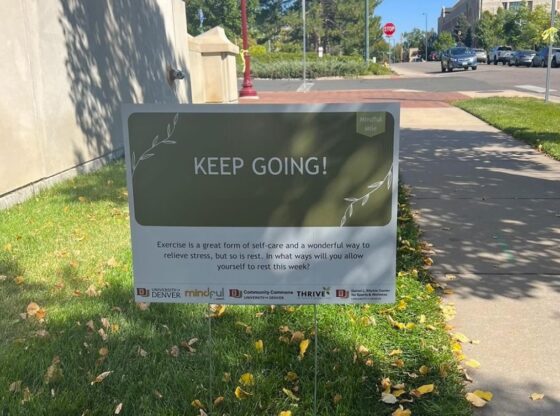It’s no secret that lots of college students find themselves strapped for cash. However, by adjusting spending habits in even the smallest ways, you can find yourself with more money in your pocket at the end of the month—money you can use to spend on something you’ve been saving up for, paying off debt or simply saving for a rainy day.
1. Spend Less Money Eating Out
Try not to eat out more than twice per week. Instead of going out to eat on the weekends, have some friends over and cook together. While dinner out for something like sushi can easily run everyone $20+, there are many quick and easy (but still tasty) recipes you can make for just a few dollars apiece.
For example, pesto pasta divided among a few friends who all bring a different ingredient for the meal— such as the noodles, sauce, or a bottle of wine— becomes affordable for everyone. Have one person get a couple boxes of pasta, one person supply a jar of pesto, one person get a bag of salad and a simple dressing like olive oil and vinegar, and one person bring a bottle of wine or a six pack. It will be cheaper, you’ll all get to do something different than just sitting at a restaurant and you won’t even have to leave the comfort of your own home (which is especially nice in the winter months).
Also try packing your lunch instead of buying. Ever seen a Bento Box at a sushi restaurant? They are basically containers with different sections for small bites of a little bit of everything; the same type of concept is an easy lunch idea. Target sells “bento” containers with different sections inside; fill it with whatever is around your house.
Some ideas are crackers, turkey and cheese, carrots, fruit, almonds, or peanut butter and pretzels. Another idea is to make enough dinner to have leftovers and take those. Don’t be tempted by the opportunity to spend $8 on Subway or $10 on Noodles every day.
Getting out of class late, trying to go to the gym and being involved in on-campus organizations make cooking hard on weeknights. Have a couple go-to quick and easy dinner ideas that you can make when you get home so you aren’t tempted to get fast food on the way home.
There are many inexpensive options at the grocery store that can be worked into your meals for the week, such as eggs, tuna and chicken. The next time you are at Safeway, make sure to check out their weekly flyer to see what specials they are running that week. This will further increase the money you save on food.
2. Make Your Own Coffee (Or Tea)
Stopping at Starbucks or Kaladis on the way to class every day is tempting, but don’t buy coffee when you can make it at home. The average medium latte at Starbucks costs around $4. For about $6, you can buy a package of coffee that will last you a week and a half to two weeks. Tea drinks are even cheaper— the average medium tea is about $2, but you can buy a box for $3 and it will last a month or more. Invest in a to-go mug (Starbucks has some great ones- try stainless steel keep your drink hot the longest), and finish your morning coffee on the way to class. If you like tea at lunch then throw a tea bag in your lunch bag and use the library’s hot water dispenser.
3. Find Cheap Entertainment Options
Instead of going to the movies and spending over ten dollars (plus the inevitable snack splurge), spend Sunday afternoon going for a walk or bike ride around Wash Park. You’ll actually get to talk to your friends, and you can see the movie when it comes out in Redbox for $1. Skip the bar and invite friends over for drinks and Cards Against Humanity or poker. Buying a bottle of wine or a six-pack is always cheaper than going out.
4. Use Your Connections
Stop paying for cable every month; buy a Dongle to hook up to your computer and go in on a Netflix account with a friend. Netflix is $8 per month, and easy to split between two or three people. a Dongle costs about $10 and it will last forever. Amazon Prime gives great discounts, especially to students, but you have to pay to create an account. Instead, find a friend who has one and share. Instead of buying movies, borrow them from friends, rent them from Redbox for $1 per night, or stop by the library, which has shelves stocked with movies and TV show series.
5. Be Creative
If you find yourself spending an extra $10 when your data runs out every month, it really adds up over time. When you’re studying at your favorite cafe, ask for their Wifi password so you don’t have to eat up your 3G. Every time you go into that cafe, your phone will automatically sync up to the Wifi. If you do this at different locations around town, including the DU campus, you’ll be using less and less data when you go out. Another little trick to saving money is to use more Tupperware than ziploc bags; You can wash Tupperware and use it again and again, while Ziploc bags are a money sucker because you only use them once then throw them out.
6. Commute More Efficiently
Getting in your car every time you need to go to Safeway adds up, and, even though gas prices have gone down, buying a tank per month is still an extra $20 to $40 or more. Walk or ride your bike, and take in the beautiful Colorado weather. Don’t be afraid to carpool, especially when it comes to trips to the mountains. It can save you lots of gas money and give you a chance to hang out with friends (and possibly meet new people) the whole ride.
7. Keep Track of Your Spending
One of the most common problems when it comes to money management is simply being unaware of certain spending habits. By keeping track of where your money goes each week, you can cut in certain areas and use that money for something much more beneficial. Keeping track of your money is now easier than ever, especially using apps such as Expensify and Check (both free on iOS and Android), which allow users to quickly and easily keep track of things like expenditures, bills and savings. Also make a habit of checking your balance every morning via your bank’s app to avoid any financial surprises.
8. Avoid Impulse Purchases
Although this is briefly touched on in several of the earlier points, just keeping your spending in check is possibly the easiest way to save money. Even if your favorite store is having a sale, even if “They never have sales,” knowing when to save money rather than spend will leave you with much more money in your pocket.
9. Don’t Kick Yourself for Mistakes
Even if you keep track of your spending and are as careful as you can be, there is always the chance you may slip up and spend a little (or a lot) more on something than you intended to. However, don’t let it get you down; try to use it as a learning experience, and avoid making the same monetary mistake in the future.
10. Don’t Forget to Splurge
With all of this said, saving money is like being on a diet; If you are too strict, eventually you’ll break down and “binge” spend. Don’t let this happen. If you’re really craving your Kaladi Latte and you’ve had a hard week, don’t deprive yourself. Splurging on coffee once per week is still much better than splurging once per day. Think about skipping dinner out tonight to save up for going to the mountains this weekend. Prioritize your spending based on what you want the most, and the benefits will be well worth it.











